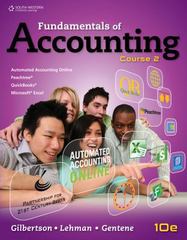Question
TXX5768 1)Which of the following statements is false? A. Generally, unless a personal service corporation establishes a business purpose for a fiscal year or makes
TXX5768
-
1)Which of the following statements is false?
A. Generally, unless a personal service corporation establishes a business purpose for a fiscal year or makes an election under IRC 444, a personal service corporation must use a calendar year as its taxable yearfor its accounting period.
B. A personal service corporation must be a C corporation.
C. A corporation is classified as a personal service corporation if the corporations'principal activity is the performance of personal services by employee-owners who own more than 10% of the fair market value of the corporations'soutstanding stock.
D. All of the above are true.
-
2)Which of the following statements is/are false?
A. In order to maintain a valid IRC 444 election after it has been made, the taxpayer must make timely tax payments to the IRS that are assessed and collected like employment taxes.
B. A taxpayer's IRC444 election is AUTOMATICALLY terminatedif the electing entity liquidates.
C. A personal service corporation's IRC444 election is terminated if it willfully fails to comply with the minimum distribution requirements to employee-owners before the end of the calendar year.
D. All of the above are true.
E. Both B & C are false.
-
3)Which of the following statements is false?
A. Oncea taxpayer chooses a method of accounting for a particular trade of business, the taxpayer must use the same accounting method for all trades or business in which the taxpayer has engaged.
B. When a taxpayer is using the cash method of accounting, the taxpayer generally must follow the doctrine of constructive receipt.
C. A cash basis taxpayer may exercise some control over the timing of income recognition and deduction of expenses to the extent the taxpayer controls when he pays his bills and to the extent the taxpayer controls his billing and collection practices.
D. Certain taxpayers are prohibited under the Tax Code from using the cash basis method of accounting fortaxpurposes.
E. All of the above are true.
-
4)Which of the following statements is false?
A. C corporations & partnerships with a C Corp partner may NOT use the cash basis method of accounting unless the average annual gross receipts of the entity are less than or equal to $5 million.Tax shelters mayNOT use the cash basis method of accounting regardless ofthe amount of theirgross receipts.
B. Under the accrual basis of tax accounting, income recognition may be postponed when there is a possibility that the income may have to be returned or refunded.
C. For accrual basis taxpayers, income recognition is determined by the "right" to receive income and NOT its actual receipt.
D. All of the above are true.
-
5)Which of the following statements is false?
A. In general, an accrual basis taxpayer cannot take a deduction for an accrued expense unless "economic performance" has occurred with respect to the particular item accrued.
B. An accrued expense may be deductible even if economic performance has not yet occurred if the "all events test" is met, the expense is a "recurring item," and economic performance occurs within 81/2 months after the close of the tax year.
C. In the case of services provided to an accrual basis taxpayer, economic performance occurs in the tax year that the services are provided or performed.
D. The recurring item exception to the economic performance requirement for deducting an accrued expense is available to taxpayers classified as tax shelters.
E. All of the above are true.
-
6)Which of the following statements is false?
A. Generally, subject to a few exceptions, taxpayers who perform long term construction contracts to construct real estate may choose between the completed contract-method of accounting or the percentage of completion method for tax accounting for long-term construction contracts.
B. Generally, the tax code requires the use of the percentage of completion method of accounting and blocks the use of the completed contract method forconstructioncontracts that cannot be completed withinone year.
C. The tax code allows the use of the completed-contract method of accounting for long-term construction contractsby taxpayers whose average annual gross receipts do not exceed$10 million. and where the contract is expected to be completed within two years from the commencement date.
D. B& C are both false.
E. A & C are bothfalse.
Step by Step Solution
There are 3 Steps involved in it
Step: 1

Get Instant Access to Expert-Tailored Solutions
See step-by-step solutions with expert insights and AI powered tools for academic success
Step: 2

Step: 3

Ace Your Homework with AI
Get the answers you need in no time with our AI-driven, step-by-step assistance
Get Started


